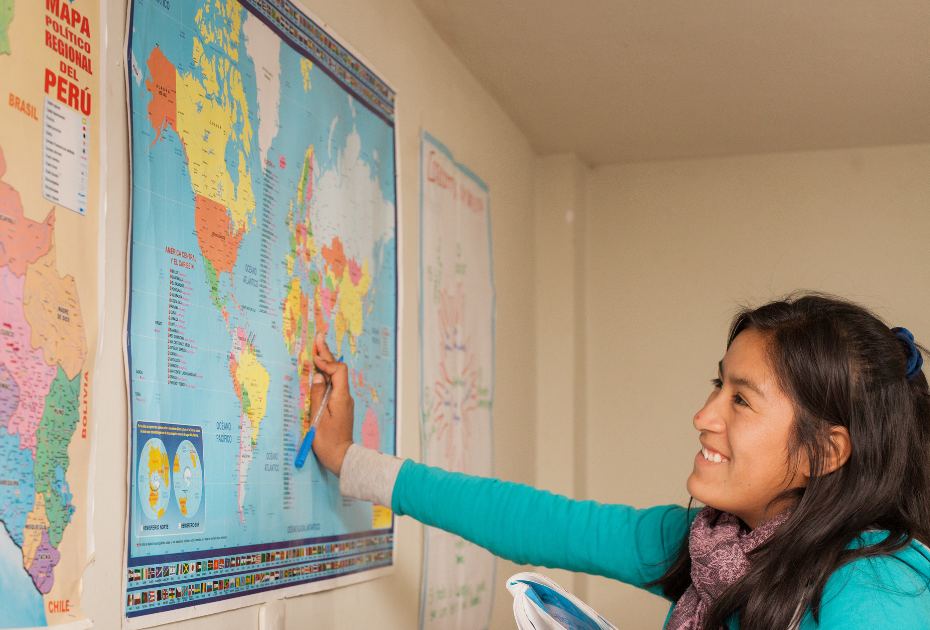
MISSION & IMPACT
The Sacred Valley Project Mission
The mission of the Sacred Valley Project (SVP) is to provide boarding and supplementary education for young women from remote Andean communities so that they can continue and complete their secondary education.
SVP facilitates secondary school access for indigenous girls from remote communities. SVP currently operates three dormitories, enabling 54 girls to attend secondary school. The dormitories remove the barrier of a long, unsafe and often impossible journey to secondary school. While living at the dormitory, girls receive comprehensive support and full-time supervision. SVP provides daily balanced meals, supplemental academic support through small-group tutoring, extracurricular activities, and mental and physical health care. SVP’s culturally sensitive approach is guided by community engagement in the project. Many SVP graduates have the goal of returning home after their studies to support their families and communities.
SVP envisions a world in which every girl has access to a quality education and the opportunity to reach her full potential. SVP aims to achieve this vision by supporting rural, indigenous Peruvian girls in their educational goals.


Why Girls?
-

Girls’ education strengthens economies and creates jobs. Millions of educated girls, means more working women with the potential to add up to $12 trillion USD to global growth. -Malala Fund
-

Educated women invest 90% of their earnings back into their families. -Clinton Global Initiative
-

420 million people would be lifted out of poverty by achieving a secondary education. This would cut the number of people living in poverty by more than half. -UNESCO
-

Communities are more stable — and can recover faster after conflict — when girls are educated. When a country gives all its children secondary education, they cut their risk of war in half. Education is vital for security around the world because extremism grows alongside inequality. -Malala Fund
-

Educated girls are healthier citizens who raise healthier families. The World Bank reports that universal secondary education for girls could virtually eliminate child marriage. Each year of secondary education reduces the likelihood of marrying as a child by five percentage points or more. -The World Bank
-

Investing in girls’ education is good for our planet. Secondary schooling for girls the most cost-effective and best investment against climate change. Research also suggests that girls’ education reduces a country’s vulnerability to natural disasters. -The Brookings Institute
Why We Do This Work
In the Sacred Valley of Peru, the world’s most direct descendants of the Inca Empire live in extreme poverty, struggling to meet even the most basic of needs. One of the most severe problems for rural villages in the region is a lack of access to public services. Children must walk several hours to the nearest elementary school and high schools are often only located in larger towns, too far from home for students to commute daily. While boys often move to urban centers to pursue an education, this same opportunity is not available for many girls. In 2010, SVP was founded in order to address the need for better access to secondary schools for adolescent girls. During our first year of operation, we served 6 students. Today, SVP serves more than 50 girls from over 20 different Andean communities in the Sacred Valley of Peru.
How We Accomplish our Mission
The Sacred Valley Project addresses the need for better access to secondary school for Quechua girls from rural Andean communities by removing the barrier of a long and unsafe journey, providing a dormitory and education center where the girls can live in a safe and nurturing environment all while receiving nutritious meals, after school tutoring, mentorship and post-secondary guidance.
Academics
From inception, the dormitory was intended to be more than just a living space. It is a place of community and growth, in which the girls learn to set goals and achieve them in a warm and positive environment. We provide a space that nurtures and supports indigenous girls in their endeavor to adapt to the culture of an urban area, Spanish speaking schools, and academic struggles as result of poor primary education. Each year, SVP beneficiaries receive over 2000 hours of professional tutoring and academic support from local, Quechua speaking tutors. As a result of this support, 100% of SVP students are currently graduating from the program.




